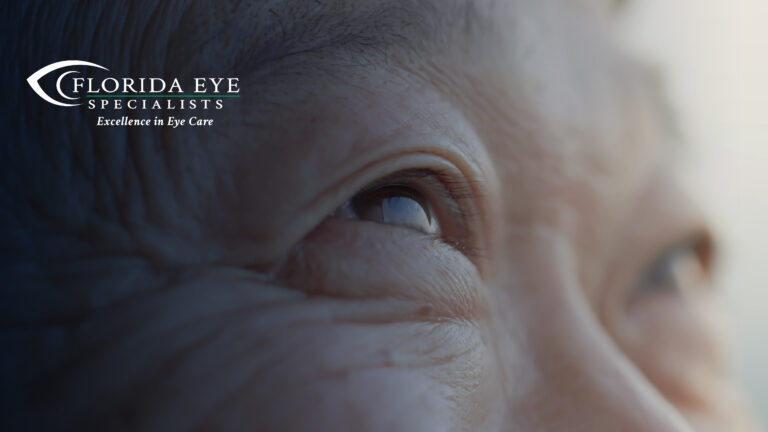Cataracts are a clouding of the normally clear lens of the eye. Everyone develops cataracts with age. While most people start noticing symptoms in their 60s or 70s, they can begin in your 40s and 50s. The first signs of cataracts can be mild, so it’s essential to learn the symptoms that may mean you need cataract surgery.
What is the first sign of cataracts?
“My patients often first notice difficulty driving at night,” said Dr. McGregor Lott, an ophthalmologist at Florida Eye Specialists. “They’ll say headlights from oncoming cars cause glare, or they see halos around lights.”
Dr. Lott explained that cataracts will make it difficult to see the fine details needed for any activity, from golfing to reading the menu at a restaurant.
“Cataracts create a blurring of an image,” he said. “But it happens so slowly that people just adapt. They don’t realize what they’re missing until they get it fixed. My cataract surgery patients often say, ‘I had no idea my vision could be so much better.’”
Common cataract symptoms
You don’t have to struggle with dull, blurred vision or give up the activities you love. Don’t overlook these signs that you might have cataracts.
- Blurry Vision
- Seeing Double
- Difficulty Reading Small Print
- Difficulty Driving at Night
- Increased Light Sensitivity
- Seeing Halos Around Lights
- More Frequent Lens Prescription Changes
- Trouble With Night Driving
- Colors Look More Faded
If you find that you need to alter your eyeglass prescription more frequently, keep in mind that corrective lenses can’t treat the effects of cataracts.
The benefits of cataract surgery
The only treatment for cataracts is to remove them through cataract surgery, a standard and safe outpatient procedure. Dr. Rajesh Shetty, an ophthalmologist and CEO of Florida Eye Specialists, explained that patients can undergo cataract surgery much earlier today than they once did.
“Thanks to today’s advanced technology, cataract surgery is safer and provides better outcomes than ever, so patients don’t have to live with impaired vision,” he said.
According to Dr. Shetty, younger cataract surgery patients tend to heal more quickly, resume normal activity more rapidly, and enjoy better vision results. That’s good news since vision needs have become more demanding with technological advances and today’s active adult lifestyle.
“Vision needs have changed a lot,” said Dr. Shetty. “We spend much more time looking at phones and other devices; friends and family communicate with us constantly. We’re traveling more, looking at GPS, and driving during dusk, dawn, rain, and nighttime. We’re playing golf and reading. The demand for clear vision is at the highest it’s ever been.”
Customize your vision with the Light Adjustable Lens
Not only is cataract surgery safer than ever, there are many more options to improve your sight. One of the newest is the Light Adjustable Lens, the first cataract lens implant that can be customized to your lifestyle after surgery. This technology allows patients to test-drive their vision and make changes as needed.
One of Dr. Shetty’s patients, 66-year-old Barbara Oukrop, said she is thrilled with her results. “It’s amazing — I’m out of my glasses, and I’ll never go back to having bad vision,” she said. “I used to have to wear glasses for everything. Now, I almost never need my readers. I’m so thankful I got it done.”
Take advantage of advanced laser technology
Another advanced option for cataract surgery utilizes laser technology. Our experienced eye surgeons use the most advanced femtosecond LenSx laser available, resulting in a safer, gentler, and more precise procedure. It can even correct astigmatism.
If you think you might be ready for cataract surgery, prepare for your first appointment with our list of questions to ask your cataract doctor here.
Schedule your consultation with a cataract doctor
The eye surgeons at Florida Eye Specialists recommend that patients ages 60 and older have a comprehensive dilated eye exam at least once every two years. In addition to cataracts, your eye care professional can check for signs of age-related macular degeneration, glaucoma, and other vision disorders.
Schedule an appointment with a board-certified ophthalmologist at Florida Eye Specialists today to begin your cataract removal journey. Our ophthalmologists have years of training through medical school, residency, fellowship, and post-fellowship work. Many of them also spent years as professors and surgeons at Mayo Clinic before joining our team. They look forward to providing you with excellence in eye care.

